2014 年 3 月公共英语三级考试真题及答案
SECTION I Listening Comprehension (略)
SECTION Ⅱ Use of English
( 15 minutes)
Directions:
Read the following text. Choose the best word or phrase for each numbered blank
and mark A, B,C, or D on your ANSWER SHEET.
In the United States today, families basically have two contrasting attitudes
toward television. Many families 26 the television to be on at any time of the day
or night. Very often, 27 of these families watch television 28 or don' t interact
with other family members 29 they are watching. The TV is used to make 30 kind of
background noise in the house, 31 as a kind of electronic babysitter. Parents often
turn it on to 32 "bored" children. In contrast, other families 33 control when the
television will be watched and what programs can be watched. 34 these families watch
programs together and discuss them together. In these homes, the TV is rarely on
35 nobody is watching it. Parents don't use it as an electronic babysitter; 36 they
insist that children read or play 37 rather than sit in front of a screen.
38 the contrasting attitudes toward television 39, families in America are
choosing television 40 other passive activities, such as watching movies, playing
video games, and surfing the Web 41 regularity that has never happened before. These
activities are 42 in their inactivity. Family members--young and old--watch rather
than 43. These passive forms of entertainment 44 , rather than encourage, family
45 and community involvement.
26. [A] allow [B] enable [C] cause [D] require
27. [A] parents [B] members [C] seniors [D] children
28. [ A ] singly [ B ] loosely [ C ] flexibly [ D ] directly
29. [ A ] which [ B ] while [ C ] whereas [ D ] wherever
30. [ A ] little [ B ] such [ C ] some [ D ] this
31. [A] or [B] and [C] thus [D] so
�
32. [ A ] enlighten [ B ] entertain [ C ] move [ D ] manage
[ D ] manage
33. [ A ] effectively [ B ] strictly [ C ] unwillingly [ D ] widely
34. [ A ] Never [ B ] Hardly [ C ] Seldom [ D ] Often
35. [A] if [B] even if [C] so [D] so that
36. [ A ] however [ B ] instead [ C ] moreover [ D ] therefore
37. [A] separately [B] quietly [C] creatively [D] actively
38. [ A ] Because of [ B ] In place of [ C ] In spite of [ D ] Speaking of
39. [A] viewing [R] educating [C] broadcasting [D] programming
40. [ A ] among [ B ] despite [ C ] and [ D ] as
41. [A] with [B] by [C] for [D] over
42. [ A ] usual [ B ] common [ C ] same [ D ] similar
43. [ A ] sleep [ B ] sit [ C ] eat [ D ] do
44. [ A ] weaken [ B ] end [ C ] avoid [ D ] worry
45. [ A ] building [ B ] interaction [ C ] planning [ D ] reunion
SECTION Ⅲ Reading Comprehension
(40 minutes)
Part A
Directions:
Read the following three texts. Answer the questions on each text by choosing
A, B, C or D. Mark your answers on your ANSWER SHEET.
Text 1
Nisaburo and Hiroko Ohata are unlike most Japanese couples their age. Sure,
�
Hiroko,58, is worried about her husband' s high blood pressure, while Nisaburo,60,
promises his wife that if she loses 18 pounds they' 11 take a trip abroad. What makes
the Ohatas different is how they met, through a matchmaking organization for single
seniors. " On the second date, he asked if I wanted to meet his family," says Hiroko.
"I took that as a proposal. " A little rushed, perhaps, but 17years after his wife'
s death, Nisaburo knew he' d found a new wife. The couple just celebrated four years
of marital happiness last month.
In the past, people like Nisaburo and Hiroko might have chosen to live out their
lives alone. But as Japan' s society ages, attitudes about love and remarriage late
in life are changing. In 2006,according to government data, three times more men
and nearly five times more women in their 60sand 70s married for at least the second
time, compared with 20 years before.
Granted, change is slow. For this silver-haired population, the concept of
"dating" is still masked by the term ocha nomi tomodachi (friends having tea
together). And older people often need help meeting prospective mates. That' s where
specialized matchmaking services such as Ai Senior--" Love Senior"--come in. When
Shunichi lkeda started the online service three years ago, he was surprised by how
many visits he was getting from people in their 60s.
Ikeda says that his clients have an "American perspective" about the dating scene.
And their children are often very supportive, sometimes being the ones to register
parents. "More older people are realizing that life is supposed to be enjoyable--not
lonely," says Ikeda. About 17% of the matchmaking clients in Japan are over 50 years
old, according to Ai Senior, and seniors' market share has more than doubled over
the past three years.
"For older, single men, even doing laundry or cooking is difficult," says Ikeda.
"They want to live with a woman. Likewise, it can be boring for women living alone.
They want to provide for someone. "
46. According to the writer, the Ohatas are different from most senior Japanese
couples in that______
[A] they remarried with the help of an agency[B] they decided to marry on the
second date[C] the husband suffers from a health problem[D] the wife is concerned
about losing weight
47. As is implied in the text, Nisaburo' s proposal on the second date might
be considered______
[A] typical of single seniors [B] irresponsible to his family
�
[C] a surprise to the woman [D] a decision made in haste
48. In Japan, the change in attitudes about remarriage results from an increase
in [A] its population [B] single women______
[C] senior people [D] the divorced
49. According to Ai Senior, the matchmaking clients in Japan______
[A] admire the American lifestyle [B] are mostly under 50 years of age
[C] share a vague term for "dating" [D] doubled over the past three years
50. According to Ikeda, more single seniors remarry in order to______
[A] live a longer life [B] solve financial problems
[ C ] make their life enjoyable [ D ] support their children together
Text 2
When you become a parent, much of your focus shifts from your own future to your
kids' future. But one of the most effective ways to help your children learn to dream
big is to ensure that your own dreams don' t get pushed aside by everyday demands.
Our everyday experiences provide learning opportunities. When you tap into them,
you create a lifelong learning habit that will always keep you growing. Even your
most disappointing experiences can be turned into breakthroughs.
Every dream begins in the imagination. Take a few minutes to sit down with a
notebook and think about where you would like to be in 20 years. Write down details
about all aspects of your ideal life. Feel free to imagine. Don' t worry about whether
you know how to get there now—you have 20 years to figure that out. You can also
start by picking a year in the future and making a collection of things you' d like
in your life by then. Check in on it from time to time to see where you've made
progress.
We're often encouraged to work on our weaknesses, but working on your strengths
is easier and creates better results. For help of identifying them, ask some friends,
or colleagues to write down what they most appreciate about you. They' ll enjoy doing
this, and you' 11 feel great when you read the responses. Once you know your strengths,
you can put them to work to help you achieve your dreams.
Confidence is the foundation for all your other abilities. "Progress, not
�
perfection" is a great saying to keep your confidence high. Every night, write down
five achievements that happened that day. Big or small, it doesn' t matter. If proper,
add ideas for further progress and actions you can take to get started.
Find ways to add what you love to do to your life now. This will give you more
energy and keep you connected with your bigger dreams. Making a list of old hobbies
is a great way to restore your old passions. Things you' re enthusiastic about come
with their own store of energy. Connecting with them can give you a push when you
most need it.
51. In order to help your children to dream big you must______
[ A] fulfill everyday tasks [ B ] build your own career
[C] keep your own dreams [ D] make them look ahead
52. The writer suggests that, to begin your big dream, you should______
[A] stretch your imagination [ B ] have a best-laid plan for 20 years
[ C ] recollect all your likes and dislikes [D] engage yourself in lifelong
learning
53. According to the writer, to achieve our dreams, we should______
[ A] work on our strengths [ B ] develop our creativity
[ C ] identify our weaknesses [ D ] seek advice from friends
54. To keep high confidence, it is important for one to______
[ A ] take appropriate actions [ B ] notice his daily progress
[ C ] try his best in everything [ D ] form new ideas every day
55. The writer thinks that one can hold fast to his dream by______
[ A ] listing the details of his ideal life [B] improving some of his old hobbies
[C ] adding new ideas to his old dreams [ D ] energizing himself with old passions
答案
第一部分听力(略)
�
第二部分英语知识运用
参考译文
如今,美国家庭对于电视基本上存在着两种对立的态度。许多家庭无论白天黑夜都
让电视开着。这些家庭的成员通常独自看电视或看电视时彼此不交流。电视被用作家庭的某
种背景噪音或安抚孩子的电子保姆。父母常打开电视来吸引孩子的兴趣。与之相反,其他的
家庭严格控制看电视的时间和内容。这些家庭常在观看并讨论电视内容。在这些家庭中,如
果没人看,电视就会被关上。家长也不会用它来哄孩子。相反,他们宁愿让孩子安静地读书
或玩耍,而不是看电视。
尽管对于观看电视存在着不同的观点,美国家庭在一些动中都选择了电视。这些活
动包括定期看电影、玩电子游戏些活动以前根本不存在。这些活动的相似点在于其被动性。
家庭成员,无论长幼,都在“看”,而不在“做”。这些被动形式的娱乐不但没有加强反而减
弱了家庭互动和社区参与。
26.A【精析】本题考查的是固定用法。“allow…to do…”表示“允许做某事”,该
句意为“都让电视开着”。故选 A。
27.B【精析】本题考查的是固定用法。“members of these families”表示“家庭
成员”,故选 B。
28.A【精析】本题考查副词词义辨析。这里是说“这些家庭的成员独自看电视或看
电视时不相互交流”。因此只有“singly”符合题意,故选 A。
29.B 【精析】本题考查的是时间状语从句的引导词。句意同 28 题,故选 B。
30.C【精析】本题考查的是固定用法。“some kind”表示“某种”,故选 C。
31.A【精析】本题考查上下文语义的衔接,此处是说“或用作安抚孩子的电子保姆”,
选项“or”符合题意。故选 A。
32.B【精析】本题考查上下文语义的衔接。此处是说“父母常打开电视来吸引孩子
的兴趣”。“entertain sb.”表示使人娱乐,符合题意。故选 B。
33.B【精析】本题考查上下文的语义的衔接。此处是说“与之相反,其他家庭严格
控制看电视的时问和内容”,选项“strictly”符合题意。故选 B。
34.D【精析】本题考查频率副词词义辨析。“often”表示“通常”,根据句意,故
选 D。
35.A【精析】这里考查条件句的引导词.,此处是说“如果没人看,电视就会被关
上”,选项“if”符合题意。故选 A。
�
36.B 【精析】本题考查上下文语义的衔接。前后两句意思相反,四个选项中,只
有“instead”符合题意,故选 B。
37.B【精析】本题考查上下文语义的衔接。此处意为“他们情愿让孩子安静地读书
或玩耍”。四个选项中,只有“quietly”符合题意,故选 B。
38.C【精析】本题考查上下文语义的衔接。此处意为“尽管对于观看电视存在着不
同的观点”,四个选项中,只有“in spite of”表示让步关系,故选 C。
39.A 【精析】本题考查是固定用法。“television viewing”表示“观看电视”,
故选 A。
40.C【精析】本题考查上下文语义的衔接:这里是说“美国家庭都选择电视和其他
一些被动性的活动”,只有选项“and”符合题意。故选 C。
41.A【精析】本题考查固定用法。“with regularity”表示“定期;有规律地”,该
句意为“这些活动包括定期看电影、玩电子游戏和上网”。故选 A。
42.D【精析】本题考查形容词词义辨析。这里是说“这些活动的相似点在于其被动
性”。选项中,“common”表示“共有的”;“similar”表示“相似的,类似的”,而且“be similar
in...”是固定搭配。故选 D。
43.D【精析】本题考查上下文语义的衔接。此处是说“都在‘看’,而不再‘做…,
选项“do”体现了与“watch”的对立,突出了看电视的被动性,故选 D。
44.A【精析】本题考查上下文语义的衔接。此处是说“这些被动形式的娱乐不但没
有加强反而减弱了家庭交流和社区参与”,选项“weaken”符合题意。故选 A。
45.B 【精析】本题考查上 F 文语义的衔接。由该句可知:“这些被动形式的娱乐不
但没有加强反而减弱了家庭互动和社区参与”。“family interaction”意为“家庭互动”,
符合题意。故选 B。
第三部分 阅读理解
Part A
Text1
参考译文
Nisaburo 和 Hirok00hata 与大多数日本同龄的夫妻不同。当然,58 岁的 Hiroko
一直担心丈夫的高血压,而 60 岁的 Nisaburo 也承诺他的妻子,如果她减重 18 磅,就会带
她去国外旅行。Ohaas 夫妇与众不同的是他们的相遇,即通过一个为孤单老人搭桥的婚介机
�
构。“在第二次约会时,他问我想不想见他的家人?”Hiroko 说,“我把这当作是求婚。”也
许有一点仓促,但在妻子去世 17 年后,Nisaburo 知道他已经找到了一位新的妻子。上个月,
这对夫妇刚刚庆祝了他们四周年结婚纪念日。
过去,像 Nisaburo 和 Hiroko 的人可能会选择独自生活。但随着日本社会的老龄化,
人们对爱情和老年再婚的态度也在改变。根据政府数据显示,与 20 年前相比,在 2006 年,
六七十岁的人群中,有三倍以上的男性和几乎五倍的女性选择第二次婚姻。
当然,这种变化是缓慢的。对“银发”人群来说,“约会”在很大程度上仍然被遮
掩成是一起喝茶的朋友。老年人经常需要一些帮助来面见可能的伴侣。这就是专业婚介服务
如“艾老人”——“爱老人”的由来。三年前,Shunichi Ikeda 开始在线服务,很多 60 多
岁的人提出问询,他感到很惊讶。
Ikeda 说,他的客户对约会的场景存在着一个“美国视角”。他们的孩子往往也很
支持,有时还会亲自为父母注册。Ikeda 说:“越来越多的老年人意识到生活应该是快乐的,
而不是寂寞的。”根据“艾老人”的统计,在日本,约 17%的被牵线搭桥的客户超过 50 岁,
而且老年人的市场份额已经比过去三年增加了一倍。
“对年纪大的、独居的男性老人来说,洗衣做饭都很困难,”Ikeda 说,“他们想有
个老伴。同样,独居的女性也很乏味,她们也想有个伴。”
46.A 【精析】细节题。从文章第一段第三句话“What makes the Ohatas different
is how they met, through a matchmaking organization for single seniors.”可知:
这对夫妻和同龄的日本夫妻相比,其特殊性在于他们是通过相亲机构介绍再婚的。故选 A。
47.D【精析】推断题。从文章第一段第六句话“A little rushed,perhaps…”可
知:Nisaburo 第二次见面就提出面见家人有些仓促。故选 D。
48.C 【精析】细节题。从文章第二段第二句话“But as Japan's society ages,
attitudes about love and remarriage late in life are changing.”可知:但随着日本
社会的老龄化,人们对爱情和老年再婚的态度也在改变。故选 C。
49.D【精析】细节题。从文章第四段第四句“…and seniors' market share has more
than doubled over the past three years.”可知:老年人的市场份额已经比过去三年增
加了一倍。故选 D。
50.C【精析】细节题。从文章第四段第三句…More older people are realizing that
life is supposed to be enjoyable--not lonely,’ says Ikeda.”可知:在 Ikeda 看来,
更多的老年人再婚是使他们的生活变得快乐。故选 C。
Text2
参考译文
�
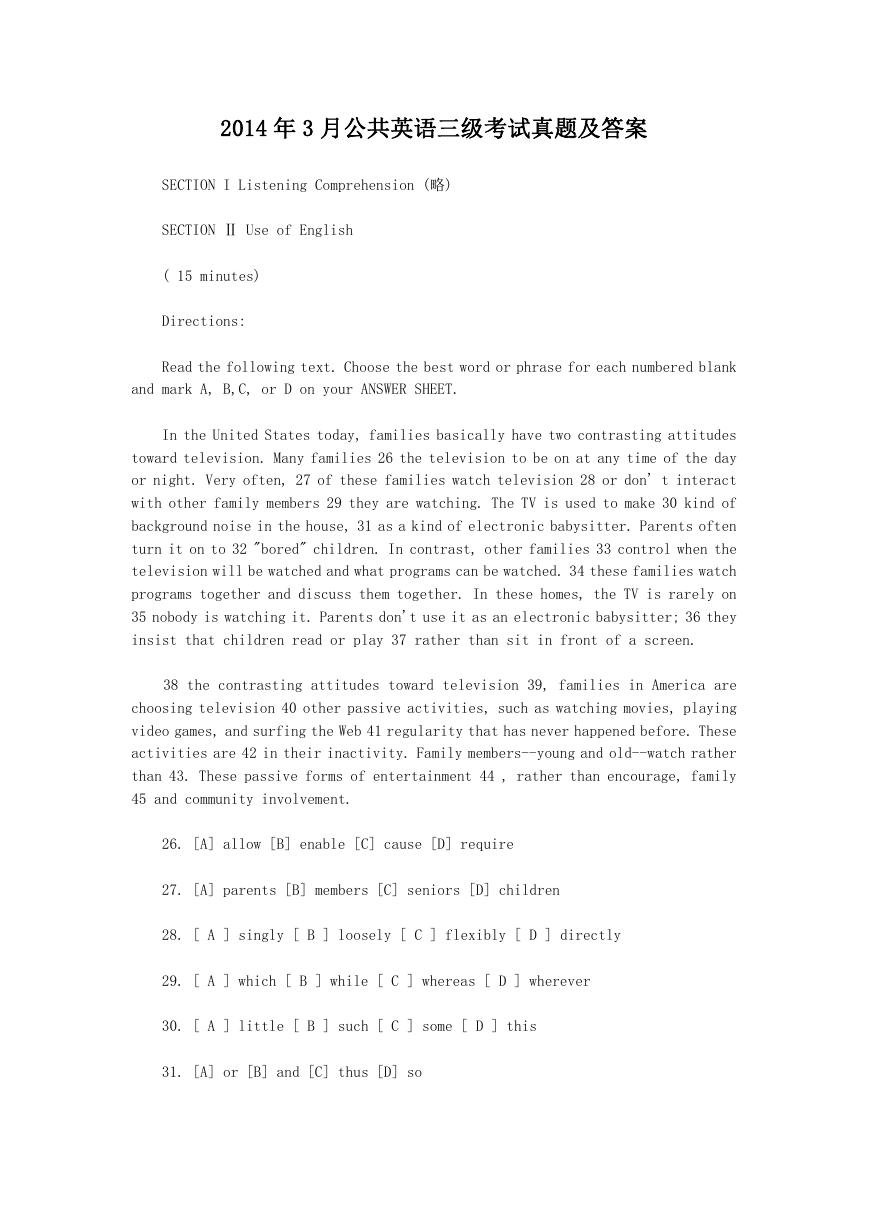
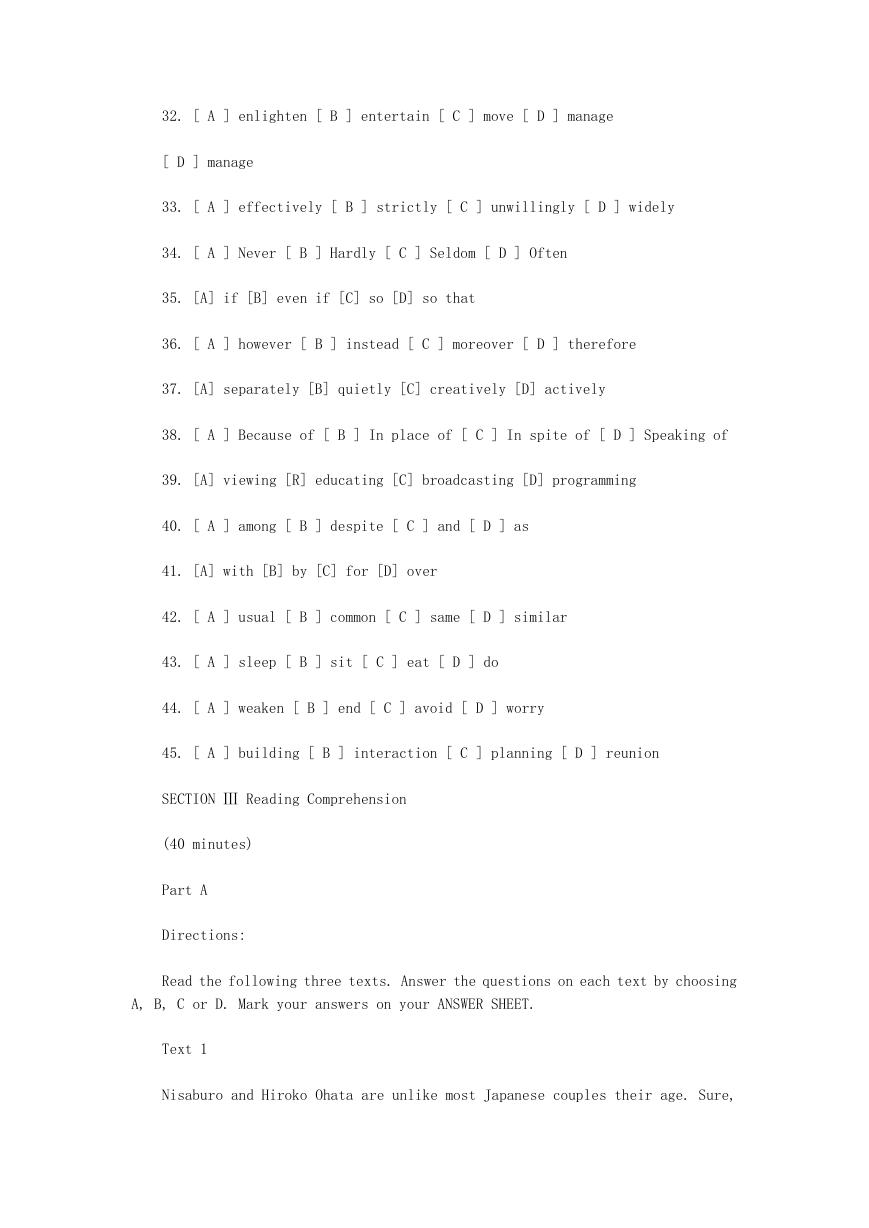
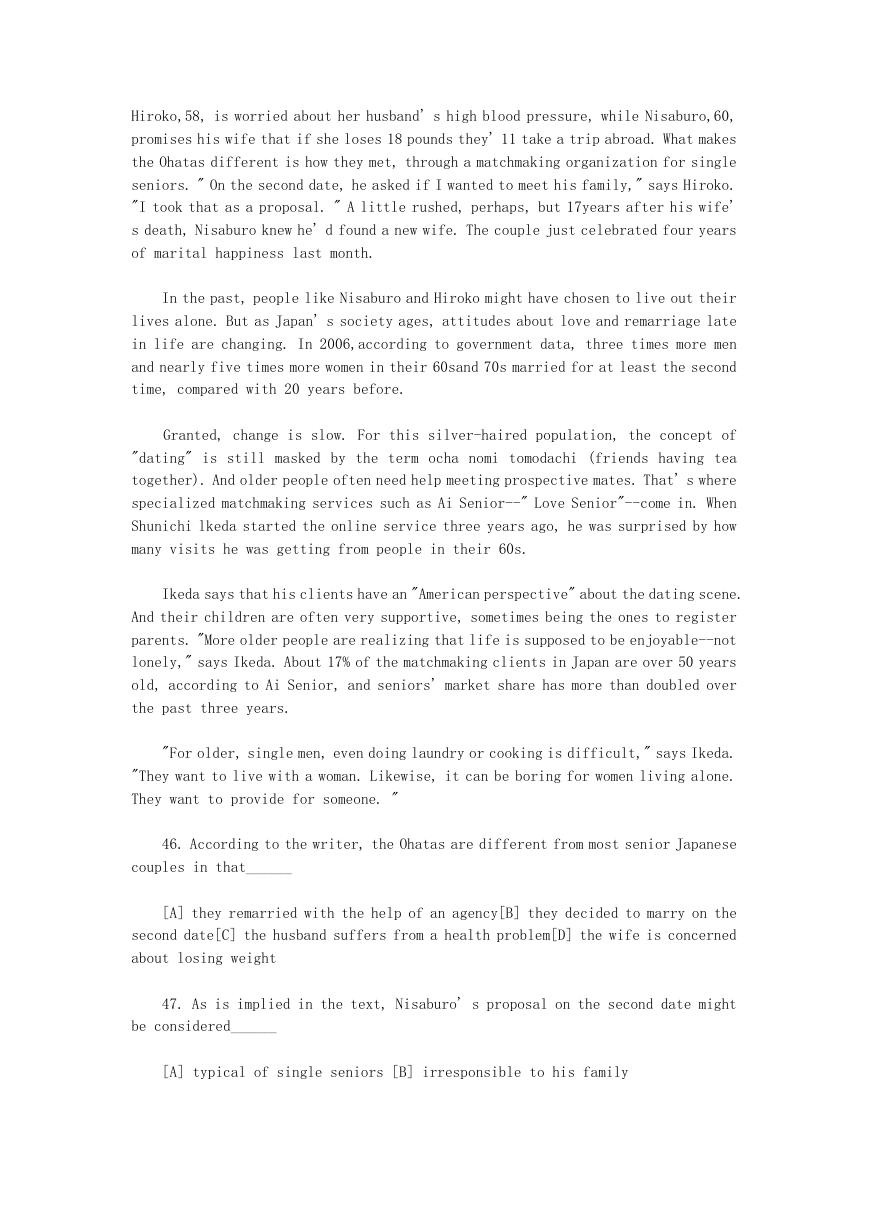
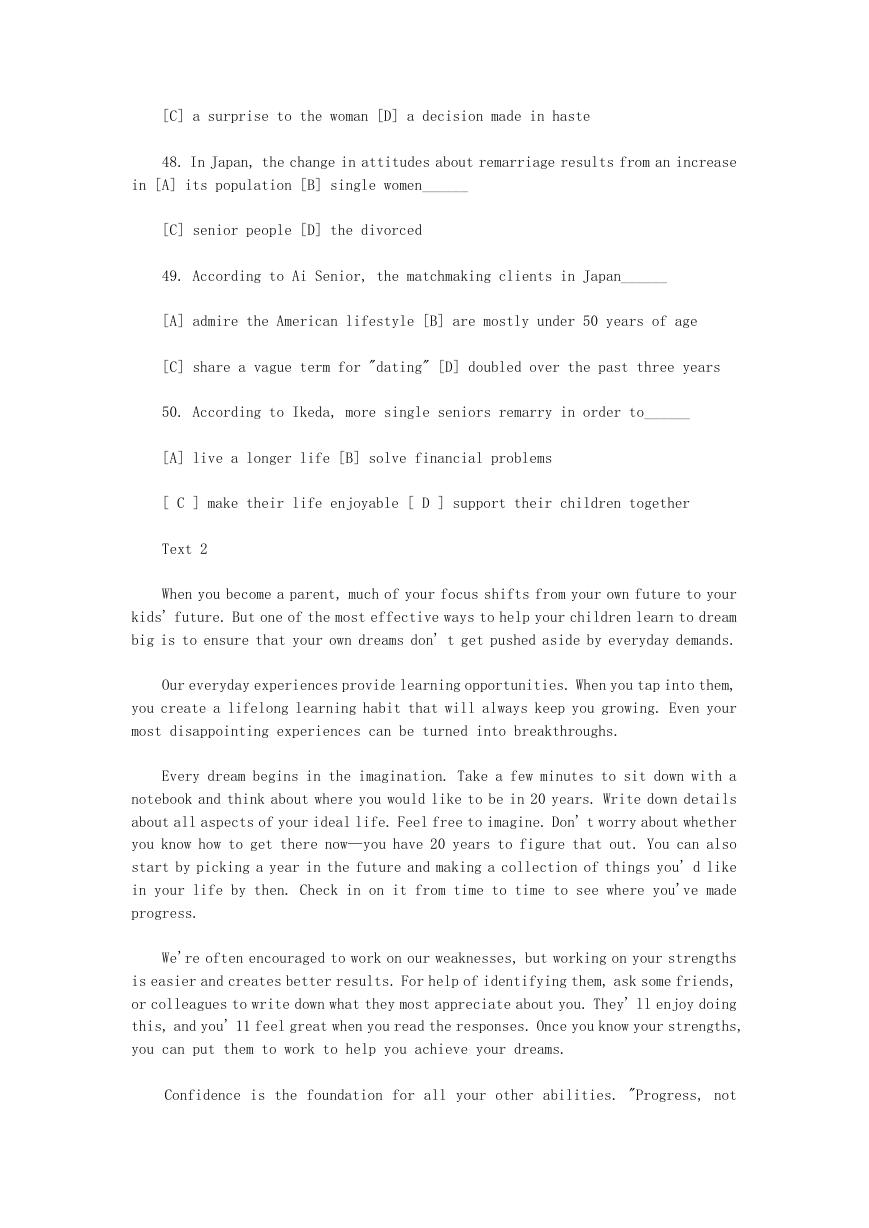
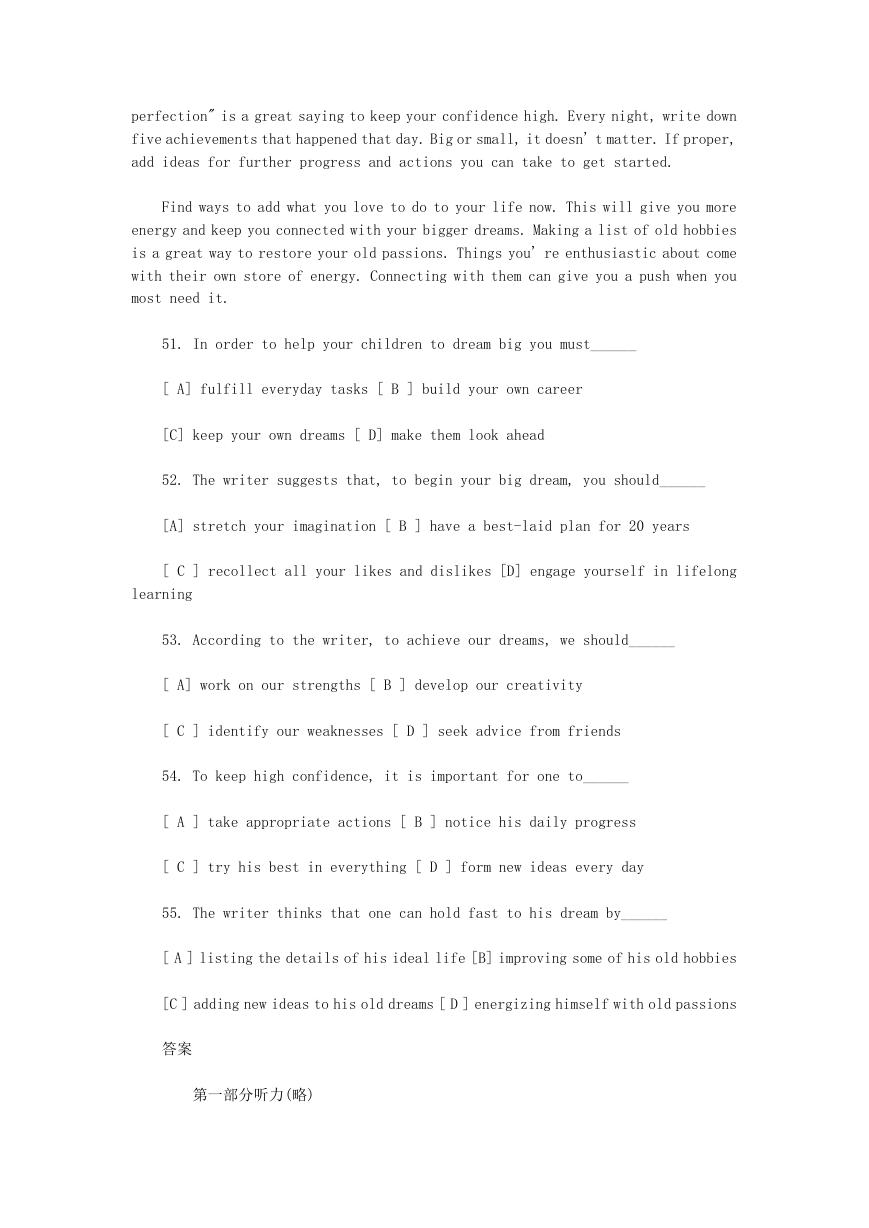
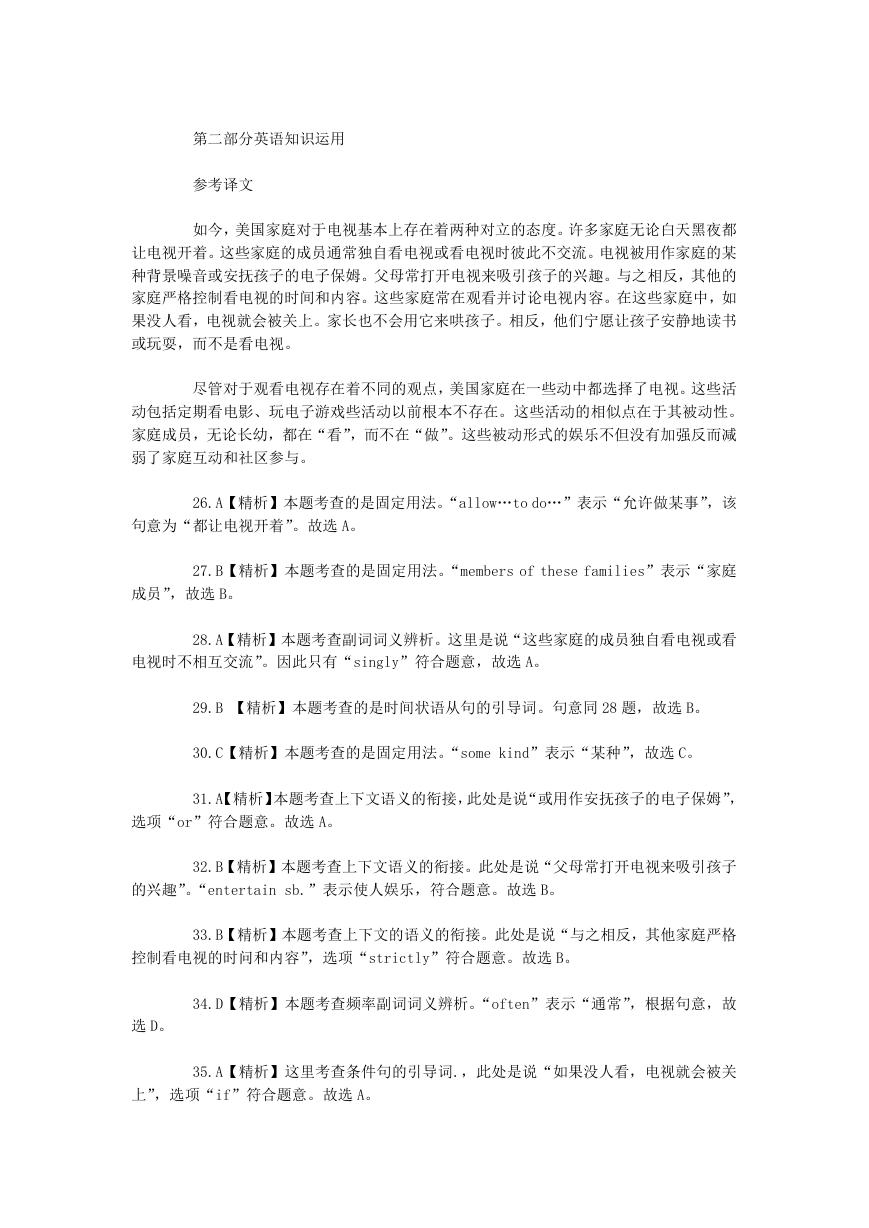
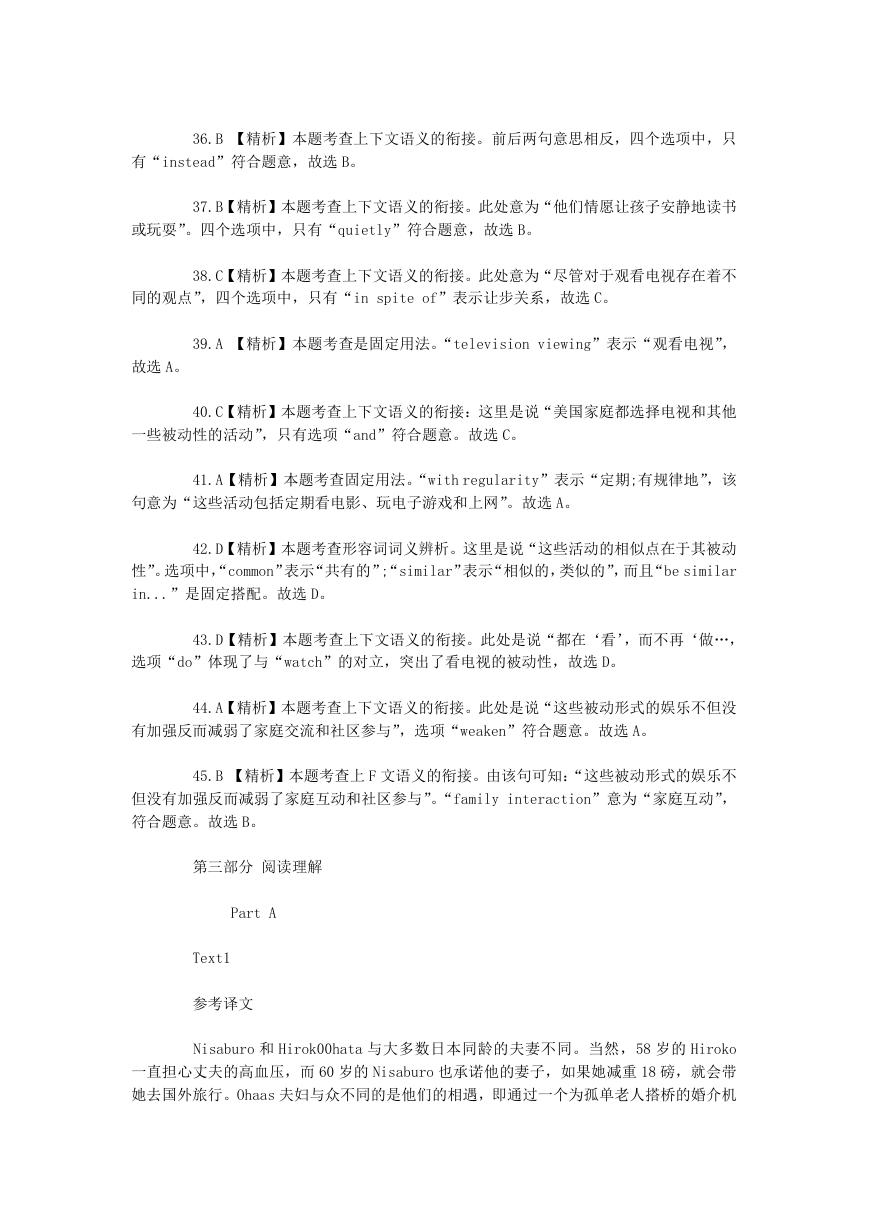
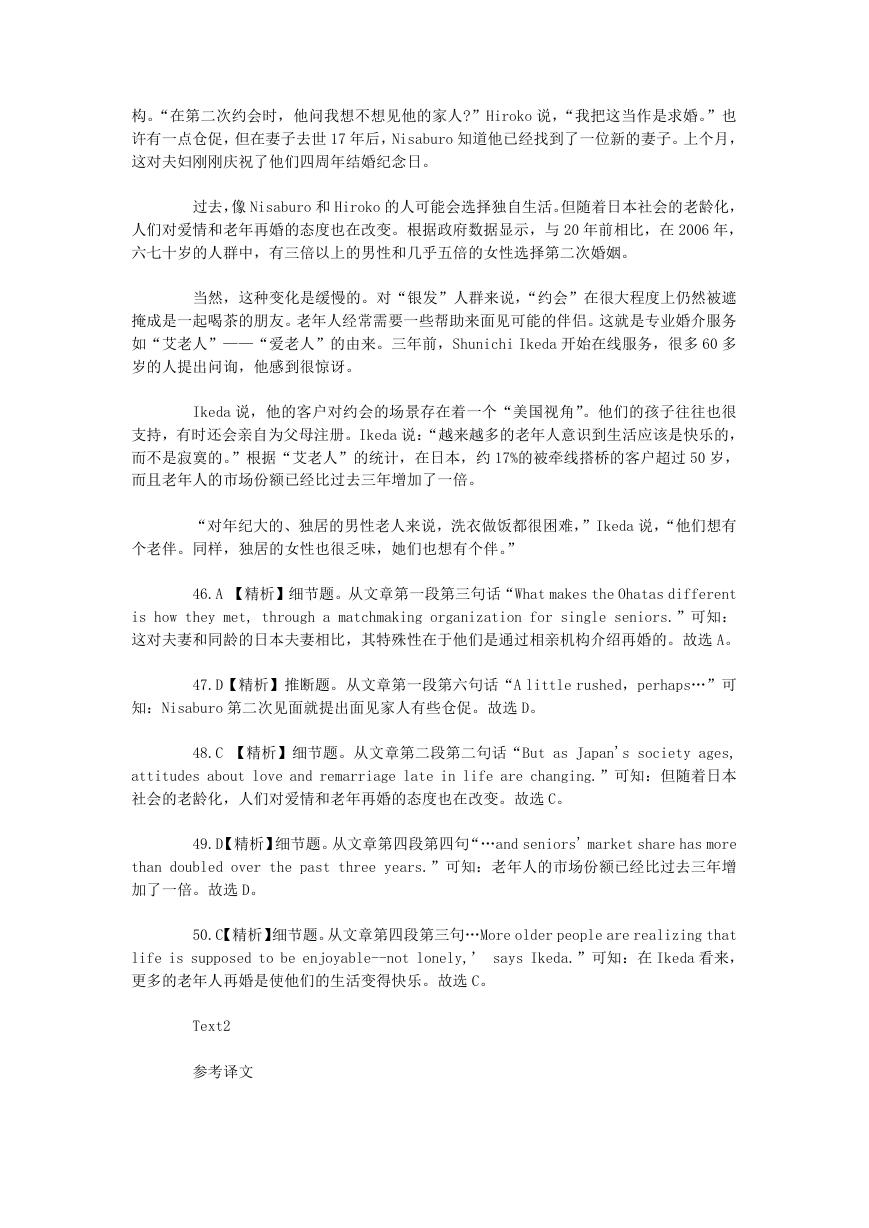








 2023年江西萍乡中考道德与法治真题及答案.doc
2023年江西萍乡中考道德与法治真题及答案.doc 2012年重庆南川中考生物真题及答案.doc
2012年重庆南川中考生物真题及答案.doc 2013年江西师范大学地理学综合及文艺理论基础考研真题.doc
2013年江西师范大学地理学综合及文艺理论基础考研真题.doc 2020年四川甘孜小升初语文真题及答案I卷.doc
2020年四川甘孜小升初语文真题及答案I卷.doc 2020年注册岩土工程师专业基础考试真题及答案.doc
2020年注册岩土工程师专业基础考试真题及答案.doc 2023-2024学年福建省厦门市九年级上学期数学月考试题及答案.doc
2023-2024学年福建省厦门市九年级上学期数学月考试题及答案.doc 2021-2022学年辽宁省沈阳市大东区九年级上学期语文期末试题及答案.doc
2021-2022学年辽宁省沈阳市大东区九年级上学期语文期末试题及答案.doc 2022-2023学年北京东城区初三第一学期物理期末试卷及答案.doc
2022-2023学年北京东城区初三第一学期物理期末试卷及答案.doc 2018上半年江西教师资格初中地理学科知识与教学能力真题及答案.doc
2018上半年江西教师资格初中地理学科知识与教学能力真题及答案.doc 2012年河北国家公务员申论考试真题及答案-省级.doc
2012年河北国家公务员申论考试真题及答案-省级.doc 2020-2021学年江苏省扬州市江都区邵樊片九年级上学期数学第一次质量检测试题及答案.doc
2020-2021学年江苏省扬州市江都区邵樊片九年级上学期数学第一次质量检测试题及答案.doc 2022下半年黑龙江教师资格证中学综合素质真题及答案.doc
2022下半年黑龙江教师资格证中学综合素质真题及答案.doc